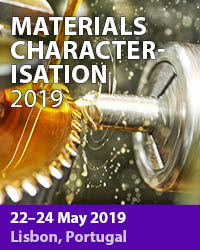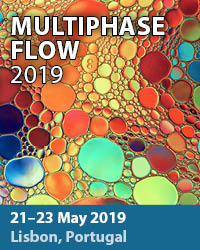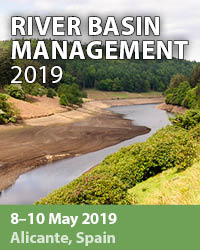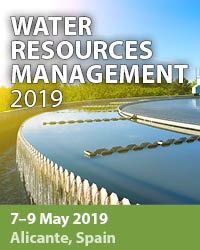9th International Conference on Computational Methods and Experiments in Material and Contact Characterisation
22–24 May 2019
Lisbon, Portugal
Overview

The 9th International Conference on Computational Methods and Experiments in Material and Contact Characterisation took place in Lisbon, Portugal from 22nd to 24th May 2019. The Conference was organised by the Wessex Institute, UK, represented by Santiago Hernandez, Lisbon University, Portugal, represented by Rui Vilar, the University of Windsor, Canada, represented by Derek Northwood and the University of Groningen, The Netherlands.
The conference is a result of a series of meetings that started as early as 1993 in Southampton on contact mechanics and previous meetings on the wider field of material characterisation, dating from the 2003 conference in Santa Fe, New Mexico. It is well-established and always attracts a wide international spread of delegates. The aim of the conference is to facilitate interaction between the research and industrial community and discuss the latest developments in this rapidly advancing field. The meeting responds to the demand for high quality production for both industry and consumer, which has led to rapid developments in materials science and engineering. This requires the characterisation of the properties of materials.
Opening of the Conference
The conference was opened by Santiago Hernandez who welcomed the delegates to the conference, before paying tribute to the founder of the Wessex Institute, the late Prof Carlos A Brebbia.Professor Hernandez then mentioned that the main object of WIT is the dissemination of knowledge, with particular emphasis on science and engineering. Another way in which this is achieved is by the publication of papers from conferences and Journals, through its publishing arm, WIT Press.
Professor Rui Vilar of Lisbon University, Conference Co-Chair, welcomed the attendants to Lisboa and wished to them a successful conference.
Professor Derek Northwood of the University of Windsor, Canada, Conference Co-Chair, welcomed the delegates to the conference. The conference venue, the Tryp Lisboa Oriente, is in the area of Lisbon called the Parque das Nações, a redeveloped area of Lisbon on the Tagus River, which was made in preparation for the Expo ‘98.
He then gave his Keynote presentation entitled “The effect of current mode on the plasma discharge, microstructure and corrosion resistance of oxide coatings produced on 1100 aluminum alloy by plasma electrolytic oxidation (PEO)”.
Invited Presentations
There were a series of invited lectures on advanced topics of research and applications, as follows:- “The Influence of humidity-temperature variation and high-salt-particles on the degradation of Cr, Cu and Mn based alloy steel”, by Dr Adil Saeed, Bournemouth University, United Kingdom.
- “The effect of Mg concentration and layer thickness on the adhesion of ZnMg-Zn bilayered pvd coatings”, by Dr Yutao Pei, University of Groningen, The Netherlands.
- “Flexural properties of flax sliver reinforced green composite by molding pressure and chitosan fiber addition” by Dr Hideaki Katogi, Jissen Women’s University, Tokyo, Japan.
- “Influence of silane treatment on water absorption and mechanical properties of PLA/short bamboo fiber-reinforced green composites”, by Professor Hitoshi Takagi, Tokushima University , Japan
- “Interfacial shear strength of CFRPP using uneven carbon fiber under hot-wet environment for long term “, by Professor Kenichi Takemura, Kanagawa University, Japan.
- “Electrochemical method of fretting corrosion testing in modular hip prostheses “, by Dr Ieda Caminha, National Institute of Technology, Brazil.
- “A novel technique for testing osteointegration in load-bearing conditions” by Professor Cristina Bignardi, Polytechnic University of Turin, Italy.
- “Numerical modeling and simulation of vehicular impacts on tire-mounted cable barriers”, by Professor Howie Fang, University of North Carolina at Charlotte, United States.
Conference Sessions
The papers presented during the conference were classified under the following headings:- Experimental methods
- Recycled materials
- Metallic materials
- Mechanical properties
- Mechanical and thermal properties
- Composite materials
- Materials for bioengineering applications
- Experimental approaches
- Performance based design materials
- Numerical models
Conference Publication
Papers presented at this conference will appear in Vol. 124 of the WIT Transactions on Engineering Sciences (ISSN: 1743-3533). Papers presented at the meeting will be available Open Access in the eLibrary of the Wessex Institute (https://www.witpress.com/elibrary) from where they can be freely downloaded by any interested parties.A few papers were selected for publication in the International Journal of Computational Methods and Experimental Measurements. This journal reviews the latest work in computational methods and experimental measurements, with a view to achieving harmonious development and interaction between the two. Other suitable papers were selected instead for inclusion in the International Journal of Safety and Security Engineering. This Journal aims to provide a forum for the publication of papers on the most recent developments in the theoretical and practical aspects of these important fields.


